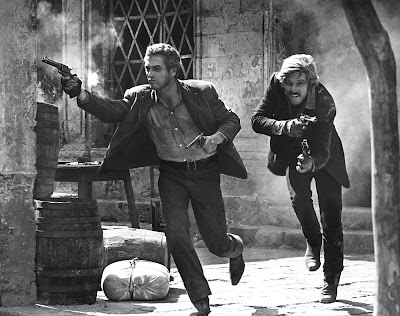 Nicholas Meyer's Time After Time is an interesting film. It takes two of the most prolific figures of turn of the century London H.G. Welles (Malcolm McDowell) and Jack the Ripper (David Warner, the photographer that loses his head in the Omen, or for you younger fans is the thug working for Billy Zane in Titanic.) and sends them to 1979 San Francisco. This probably sounds idiotic and ridiculous, but the film uses Welles folklore (mainly the time machine) to give the film a little more credibility as Welles chases Jack after his identity is revealed to the authorities. It's a basic fish out of water story for Welles, yet The Ripper fits right into the violence of late 20th century America. Welles does find a girl named Amy (Mary Steenburgen, who ironically ends up with another time traveler in Back to the Future Part III).
Nicholas Meyer's Time After Time is an interesting film. It takes two of the most prolific figures of turn of the century London H.G. Welles (Malcolm McDowell) and Jack the Ripper (David Warner, the photographer that loses his head in the Omen, or for you younger fans is the thug working for Billy Zane in Titanic.) and sends them to 1979 San Francisco. This probably sounds idiotic and ridiculous, but the film uses Welles folklore (mainly the time machine) to give the film a little more credibility as Welles chases Jack after his identity is revealed to the authorities. It's a basic fish out of water story for Welles, yet The Ripper fits right into the violence of late 20th century America. Welles does find a girl named Amy (Mary Steenburgen, who ironically ends up with another time traveler in Back to the Future Part III). Time After Time is a film that is actually better than you would expect. The story is far fetched, yet you can still believe H.G. Welles is wandering the streets of San Francisco. Malcolm McDowell delivers his best performance since Alex DeLarge in A Clockwork Orange. His out of his element face and emotional force when needed makes you feel for his character and what he goes through later in the film. David Warner is equally great as the creepy Ripper, making you see where he's coming from when he tells Welles that he was made for this violent age. Steenburgen is cast in a conflicted role that has her liberated one minute and totally dependent on Welles the next. She pulls it off with great ability and succeeds in keeping up with her two co-stars.
A fast paced adventure in our own back yard if you will, Time After Time is a great combination of thriller, adventure, and romance that delivers a film that far exceeds the total of its parts.


